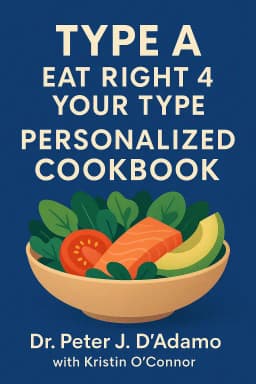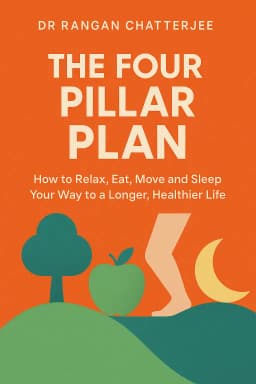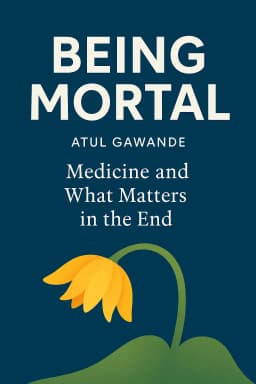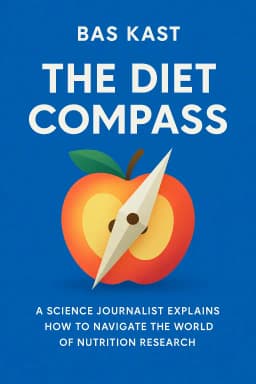
The Breakfast Lie
Golden Hook & Introduction
SECTION
Laura: Alright, Sophia. What's the one piece of health advice we've heard since we were kids? "Breakfast is the most important meal of the day." Sophia: Oh, absolutely. It's practically gospel. You skip it, you're setting yourself up for failure, right? Laura: That's what we've always been told. Well, today we're exploring a book that argues for many women, breakfast might actually be the most dangerous meal of the day. Sophia: Whoa, okay. That's a bold claim. You can't just drop that and walk away. What book is this? Laura: It's from Dr. Mindy Pelz's book, The Menopause Reset. And what's fascinating is that Dr. Pelz is a chiropractor who went on this deep personal and professional quest after her own intense menopause journey. She felt the conventional medical advice was failing women, which really fueled her mission to start what she calls a "women's health revolution." Sophia: A chiropractor leading a health revolution. I like that. It’s an outsider's perspective. But before we get to why my morning oatmeal is apparently a villain, what’s the bigger picture here? Laura: The bigger picture is that before we can even talk about food, Pelz argues we need to look at a much deeper problem, something happening at the cellular level. She believes our bodies are in a state of crisis that no amount of kale or quinoa can fix on its own. Sophia: Cellular level? That sounds intense. What does she mean by that?
The Cellular Crisis: Why Your Old Health Tricks Fail and Detox is Non-Negotiable
SECTION
Laura: She frames it as a modern paradox. We're living longer, but we're sicker. And for women hitting perimenopause and menopause, the health strategies that worked for decades suddenly stop working. You eat less, you exercise more, and the weight still creeps on. The brain fog descends. The sleep vanishes. Sophia: I know that feeling. It’s like your body’s operating system just crashed and won’t reboot. You’re doing all the right things, but nothing responds. Laura: Exactly. And the foreword of her book, written by another health expert, Dr. Daniel Pompa, tells this incredible story that gets to the heart of the problem. He was a doctor, super fit, ate a pristine diet, exercised constantly... and he was falling apart. Sophia: What happened to him? Laura: He was hit with this wave of debilitating symptoms. Crippling fatigue, anxiety, brain fog, insomnia, food sensitivities. His hair was thinning. He said he became "skinny-fat." He went to all the best doctors, ran all the tests, and everything came back "normal." They told him it was just stress. Sophia: Oh, the classic "it's all in your head" diagnosis. That’s infuriating. Laura: It is. But it forced him to look deeper. He eventually realized the root cause wasn't his diet or his exercise routine. It was his cells. They were toxic. He had accumulated heavy metals and other environmental chemicals that were poisoning his system from the inside out. His core philosophy became, "If you fix the cell, you will get well." Sophia: Okay, but the word "detox" gets thrown around a lot. It makes me think of expensive juice cleanses and celebrity-endorsed pseudoscience. How is this different? Laura: That's a fair point, and Pelz is very clear about this. This isn't about a three-day green juice fast. It's about recognizing that we live in a chemical soup. There are over 87,000 new chemicals in our environment that didn't exist 60 years ago. They're in our non-stick pans, our food packaging, our furniture, our beauty products. Sophia: So they’re everywhere. You can’t escape them. Laura: Pretty much. And these chemicals, especially things called endocrine disruptors, act like hormonal chaos agents. They block our hormone receptor sites. So your body might be producing estrogen, but the toxin is sitting in the parking spot, so the estrogen can't park and do its job. This leads to hot flashes, hair loss, anxiety—all the classic symptoms. Sophia: That makes so much sense. It’s not that the hormone isn’t there, it’s that it can’t get through the door because some chemical bouncer is blocking it. Laura: Perfect analogy. And here's the kicker for menopausal women. For years, our bodies cleverly store these toxins, like heavy metals, away in our fat and tissues to protect our vital organs. But when our hormones start to fluctuate wildly during menopause, it's like a dam breaking. Those stored toxins get released back into the bloodstream, and they often head straight for the brain. Sophia: Wait, so menopause itself can trigger a toxic flood? Laura: That's the argument. Suddenly you have memory loss, depression, irritability, and you think you're losing your mind. Pelz's point, and Dr. Pompa's, is that you're not losing your mind; you're losing your hormones because your brain, the command center for hormone production, is under toxic assault. Sophia: That is a terrifying and yet strangely empowering thought. It’s not a personal failing; it's a physiological event. So what does she suggest? Living in a bubble? Laura: Not a bubble, but becoming a gatekeeper. It’s about systematically lowering your toxic load. Simple swaps: ditch the Teflon pan for cast iron, stop microwaving food in plastic, choose organic when you can, read the labels on your skincare. It's a lifestyle shift, not a quick fix. You have to clean up the cellular environment first.
The Hormonal Hierarchy Reset: The Power of Fasting
SECTION
Sophia: Okay, so let's say you’ve started to clean up your cellular house. What's next? This is where the controversial breakfast comes in, I assume. Laura: This is exactly where it comes in. Once you start lowering that toxic burden, the next step is to work with your body's hormonal command chain, not against it. And Pelz introduces a concept she calls the Hormonal Hierarchy. Sophia: A hierarchy? Like a corporate ladder for hormones? Laura: Kind of. At the top of the pyramid, she places Oxytocin—the love and connection hormone. Right below that are Cortisol, the stress hormone, and Insulin, the blood sugar hormone. And way down at the bottom are our sex hormones: estrogen, progesterone, and testosterone. Sophia: So the sex hormones are the interns, basically. They get ordered around by the big bosses. Laura: Precisely. And in our modern "Rushing Woman's Syndrome" lifestyle, we are constantly spiking cortisol with stress and spiking insulin with frequent, carb-heavy meals. When those two bosses are always screaming, the body's main priority is to deal with them. It effectively shuts down the whole department of sex hormone production. It’s a survival mechanism. Sophia: So my stressful job and my morning bagel are telling my body to forget about making estrogen? Laura: In a nutshell, yes. And this brings us back to breakfast. To explain why it can be "dangerous," Pelz uses this brilliant analogy of our cavewoman ancestors. Imagine a cavewoman waking up. There’s no fridge full of food. She has to go out and hunt or gather. Sophia: Right, no prehistoric Starbucks. Laura: None. So her body, in the absence of food, does something amazing. Her blood sugar and insulin levels drop. This signals her liver to start producing an alternative fuel source called ketones. Ketones are incredible. They give her sharp mental clarity and a steady stream of energy, which is exactly what she needs to go find food. Her body is designed for this feast-and-famine cycle. Sophia: That makes sense. She’s running on a different, more efficient fuel. Laura: But what do we do? We wake up, and often within an hour, we eat a breakfast high in carbs—cereal, toast, a muffin. This immediately spikes our blood sugar and insulin. We never give our body a chance to flip that metabolic switch and make ketones. We're living in a state of permanent feast, which keeps insulin chronically high and contributes to insulin resistance, weight gain, and hormonal chaos. Sophia: This is where I know some readers get critical of the book. The idea of fasting and going keto can feel really restrictive and, for some, even trigger disordered eating patterns. Laura: It’s a valid concern, and Pelz addresses it. She’s not advocating for a permanent state of starvation. The key is cycling. She introduces seven different styles of fasting, and the starting point is incredibly simple: just try to go 13 to 15 hours without food overnight. For most people, that just means finishing dinner a bit earlier and pushing breakfast back an hour. Sophia: Okay, even I could probably manage that. So it’s not about skipping meals all day? Laura: Not at all, especially at first. It's about creating a daily window where your insulin can drop, which triggers a cascade of benefits. Research shows that even this simple intermittent fast can boost growth hormone—the "fountain of youth" hormone—by up to 1,300 percent. It also triggers autophagy, which is like a cellular Roomba that goes around cleaning up old, damaged cells. Sophia: A cellular Roomba! I love that. So you’re literally cleaning your body from the inside out just by changing when you eat. Laura: Exactly. She tells the story of a patient named Cathy, a high-achieving athlete who was doing everything right but was plagued by night sweats, anxiety, and weight gain. The first thing Pelz had her do was just move her breakfast back by one hour. That one small change was the key that unlocked everything. Her energy returned, the weight started to come off, and it gave her the motivation to tackle the next step, which was changing what she ate. It’s about progress, not perfection.
Synthesis & Takeaways
SECTION
Sophia: So, when you put it all together, it’s really a two-pronged attack. First, you have to clean up the cellular environment because no amount of healthy eating or exercise can thrive in a toxic body. Laura: Right, you have to address the root cause. Sophia: And then, you use these ancient, built-in tools like feast-famine cycling to work with your hormonal system instead of constantly fighting it with stress and sugar. Laura: Exactly. And the big takeaway from the book isn't just a list of 'to-dos.' It's a profound philosophical shift. Dr. Pelz says, and this is a direct quote that I love, "You can't heal a body you hate." Sophia: Wow. That hits hard. Laura: It does. She argues that for so long, women have been taught to be angry at their bodies during menopause. We're mad at the hot flashes, frustrated with the weight gain. But she reframes it completely. She says the symptoms aren't a personal failure; they are a "cry for help" from your body. They are gifts, signals that your body is asking you to pay attention and change course. Sophia: It’s a call to action, not a sign of defeat. Laura: A powerful one. The book asks us to stop being angry at our bodies for aging and start listening to them, maybe for the first time in our lives. It's an opportunity to reset not just your health, but your entire relationship with yourself. Sophia: That is a much more hopeful way to look at it. It makes me wonder, what's one 'symptom' or signal our listeners have been ignoring, thinking it was just 'part of getting older'? We'd love to hear your thoughts on this. Find us online and join the conversation. Laura: This is Aibrary, signing off.









